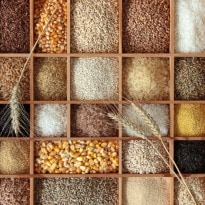In what could be bad news for countries seeking food security, researchers have found that the rising CO2 levels will deprive many food grains of their nutritional value. As carbon dioxide levels rise this century, some grains and legumes will become significantly less nutritious than they are today, they claimed."When we study all the experiments being conducted around the world, we see that an awful lot of our key crops have lower concentrations of zinc and iron in them (at high CO2)," said professor Andrew Leakey, one of the authors of the study.Atmospheric CO2 concentrations are currently approaching 400 parts per million and are expected to rise to 550 ppm by 2050. The researchers looked at multiple varieties of wheat, rice, field peas, soybeans, maize and sorghum grown in fields.
The teams simulated high CO2 levels in open-air fields. The rest of the growing conditions (sunlight, soil, water, temperature) were kept the same for plants grown at high CO2 and those used as controls. The experiments revealed that the nutritional quality of the world's most important crops dropped in response to elevated CO2.Zinc and iron went down significantly in wheat, rice, field peas and soybeans. Wheat and rice also saw notable declines in their protein content at higher CO2. "Zinc and iron deficiencies are already big global health problems for at least two billion people," Leakey added.Nutrients in sorghum and maize remained relatively stable at higher CO2 levels because these crops use a type of photosynthesis called C4 which already concentrates carbon dioxide in their leaves. "Our previous work has shown that their photosynthesis rates are not stimulated by being at elevated CO2. They already have high CO2 inside their leaves," Leakey said.More research is needed to determine how crops grown in developing regions of the world will respond to higher atmospheric CO2, Leakey said. "But it is important that we start to do these experiments in tropical climates with tropical soils, because that is just a terrible gap in our knowledge," he said.Eight institutions from Australia, Israel, Japan and the US contributed to the analysis. These new findings are reported in the journal Nature.
The teams simulated high CO2 levels in open-air fields. The rest of the growing conditions (sunlight, soil, water, temperature) were kept the same for plants grown at high CO2 and those used as controls. The experiments revealed that the nutritional quality of the world's most important crops dropped in response to elevated CO2.Zinc and iron went down significantly in wheat, rice, field peas and soybeans. Wheat and rice also saw notable declines in their protein content at higher CO2. "Zinc and iron deficiencies are already big global health problems for at least two billion people," Leakey added.Nutrients in sorghum and maize remained relatively stable at higher CO2 levels because these crops use a type of photosynthesis called C4 which already concentrates carbon dioxide in their leaves. "Our previous work has shown that their photosynthesis rates are not stimulated by being at elevated CO2. They already have high CO2 inside their leaves," Leakey said.More research is needed to determine how crops grown in developing regions of the world will respond to higher atmospheric CO2, Leakey said. "But it is important that we start to do these experiments in tropical climates with tropical soils, because that is just a terrible gap in our knowledge," he said.Eight institutions from Australia, Israel, Japan and the US contributed to the analysis. These new findings are reported in the journal Nature.
Advertisement








